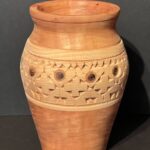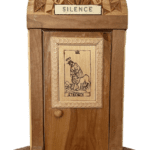How can I make meaning out of chaos by using meditation?
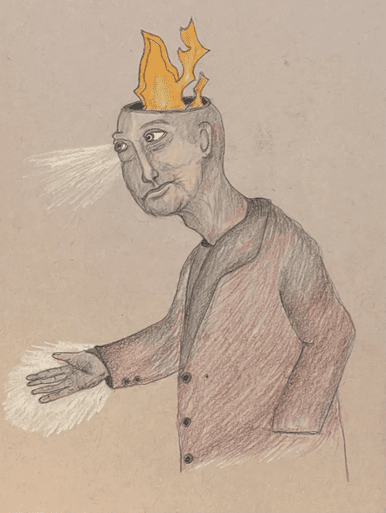
How do we deal with the chaos that is so front and center in our lives? Can we find meaning in this chaos to be able to give our lives order? It is not hard to see that the order of things is broken. A few moments spent reading a newspaper with full attention shows the many ways chaos enters life. Indeed a few hours of reading history shows that chaos has been there all along. We humans long for an orderly, predicable world but that is not what we have. Covid, our changing climate with its vast natural and human effects, war, everyday violence and disease are only the few of our many forms of chaos.
“Meaning was the frame human beings placed around the chaos of being to give it shape.”
Salmon Rushdie, Two Years Eight Months and Twenty-Eight Nights.
Lately I have been meditating on chaos and I found:
Out of chaos, order.
There is quote by the boxer, Mike Tyson (of all people) that seems to get to the heart of it:
“Everybody has a plan until they get punched in the mouth.” He said this before one of his boxing matches deriding the “plan” of his opponent. I think that this applies to all plans and expectations we have until one of the myriad forms of chaos enters our everyday life.
Perhaps, it is within our struggle with chaos that we discover meaning.
I use meditation as a way of discovering meaning. It is one of the greatest gifts meditation practices have given me: finding meaning in the hard parts of life.
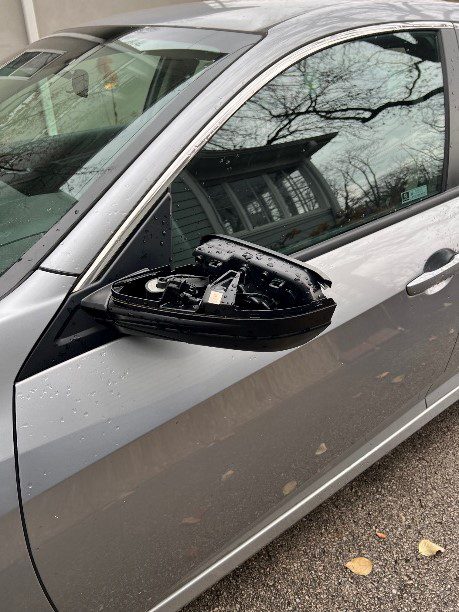
Chaos and my parked car
I live in a house across the street from the railroad tracks of a commuter line. Across the street from my house are parking spaces for commuters. They are perpendicular to the street. When one of the cars backs out of a parking space, my own car which is parked in front of my house becomes vulnerable to being hit. Indeed, during the last 40 years in which we have lived here, other cars have hit parked cars numerous times. Rarely does the driver who hits the car leave a note, taking responsibility for the damage.
Recently the city narrowed the street as part of a plan to eliminate the fees it must pay the railroad for having parking spaces on a strip of land that it owns. We had a zoom meeting with the city regarding this plan, complaining (as citizens often do) about the narrowing of an already narrow street. I reported my own experience with the many anonymous collisions my cars have suffered. It was logical concern that the narrowed street was just going to make this worse.
After two months of construction, the street looked pretty good. It was covered with new asphalt and the parking spaces were angled differently now. It seemed less likely that someone would back into my car when it was parked in front of my house.
I parked there the first night after completion of the project. The following morning I came out and found my side view mirror smashed. No one left a note. Was this totally predictable?
Taking chaos into meditation
Of course, this is not the biggest “chaos” anyone has had to deal with. But it did throw me, so I decided to use this experience in my meditation exercise. In the course of the meditation, the image led me to think of the destruction wrought by war. Specifically the horror of the war ongoing in Ukraine currently. The bombs, the destruction, the death at a level of chaos I cannot even imagine.
War justified by a leader’s narrative that sounds like, from where I sit, their own fairy tale. It led me to a deepening awareness of chaos as it enters life.
My meditation lead me to a feeling of solidarity with humanity – victims and unwitting perpetrators. It took me out of my comfortable life. My consciousness expanded even if only temporarily. Expanding consciousness is not always great. The broken side view mirror had a different meaning after my meditation. It no longer made me upset. I had to let it go. Part of me wanted to hang onto the anger, but I could no longer do so in the context of the real chaos in the world.

Chaos and lost love
Throughout much of my high school and college years I had a girlfriend. She was my first love. I loved her parents, too, and vice versa. We planned to marry. (That was the thing to do in those days.) One day she came to visit me at my college and informed me that she was breaking up with me. She had a new boyfriend. Being young and naïve, the whole experience blindsided me. I was totally devastated.
After she left, I think I spent three or four days in my room. Tears of despair. All the plans for my life vanished. I felt rejected (which I was, of course) and I felt betrayed.
Musical meditation
During this time I listened to a lot of music. I especially listened to “A Love Supreme” by John Coltrane. Listening to it over and over, seemed to bring some solace. I also listened to popular music on the radio – rock n roll, blues, folk music country music. And, probably for the first time, I related to this music with a depth of feeling and empathy that I had not previously had.
I heard and felt the chaos in romantic relationships that seemed to be in so many of the songs. So much of that music was about love and lost love. I totally identified with it. At some point, I began to feel the universality of my personal experience and new meanings arose. The experience had created new connections between me and others.
My heart opened. I had been initiated into adulthood through a broken heart. The chaos, the broken expectations, the lost love opened new avenues of empathy and connectedness. Though I was not formerly meditating at the time, I now look back on those days as my first spiritual retreat and the music as my first meditation teacher.
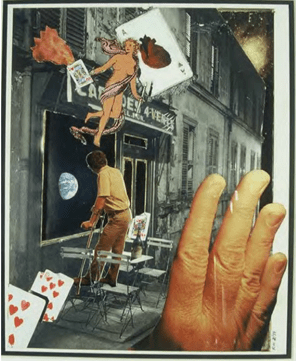
Chaos and death
Sometime later, I met a person who would become a very close friend. We met at a meditation workshop which introduced my wife and myself to Cafh. In fact, this person was one of the teachers. By chance, he and I were medical students at the same medical school. He had had childhood cancer in his leg which led to an above knee amputation.
He used two crutches to get around, but he never seemed limited by this disability. Indeed, it was clear to all that knew him, that his disability was part of what made him a most loving and insightful person. In that respect, he always seemed older and wiser than the rest of us. He was a living example of a person who had found profound meaning in his chaos.
Meaning in chaos
One summer, while sitting on a beach, he had a blood clot form in the veins of the stump of his amputated leg and the clot went to his lung. He was taken by helicopter from an island vacation place to a large city hospital in Boston. His life was saved. During a visit to his home a few years later, after a few beers, the subject of his near death came up.
He said that if he was near death in the future, he wanted to die without any attachment to life support machines: no ventilator, no intravenous lines. He asked me to promise to make sure this would happen if such a situation should arise.
This was easy for me to promise since I thought such a situation would never occur. He was in his thirties at the time.
However it did occur, only a few years later. He ended up having a similar pulmonary embolism, but this time accompanied by a heart attack. Again, he was flown from the same vacation place to a different hospital. He ended up in a coma, on a ventilator. He remained that way for days, brain dead, surrounded by family and friends from all over the world. We waited for his parents to arrive from Chile before stopping life support.
This was the ultimate chaos for them and for me, too.
When the event happened, I was 900 miles away. I initially resisted going to the hospital, thinking, what can I do? I was so busy in my medical practice that leaving seemed, well, very inconvenient. And then I remembered the promise. I would call it a vow. I had made other vows in my life, including a marriage vow, the Hippocratic oath. I also made vows in my spiritual path, including a vow of silence and a vow of fidelity to my own unfolding. I realized that the vow I had made to him had to be honored.
Maybe in practical terms, it would not mean much, but in spiritual terms, it was very important, much more than I had realized in my “everyday” state of mind. It took a meditation exercise to clarify my priorities.
In the end, I flew to the hospital and accompanied him and his family for some days. After his parents arrived, the nurses let me help remove the endotracheal tube that connected him to the ventilator, his intravenous lines and the catheter that was in his bladder. I watched the heart monitor as the last beats of his heart faded into a flat line. He died minutes later.
Chaos led to meaning-making that goes beyond the words that I can find to describe it. Even though this was thirty years ago, it remains as meaningful to me now as it did then.
Chaos and medical practice
Everyday, in my role as a physician, I see chaos at work. It enters lives in different forms. Sometime as a disease that strikes out of the blue. Or, stealthily and slowly as disease takes over a person little by little over time. It comes as loss: the loss of loved ones, the loss of being able to walk or speak. It comes with the ending of relationships. One can go on and on.
I have learned that, in addition to medical treatments, there is also the inner work that can be done by the people who are experiencing chaos. This is the effort to discover meaning in it. This meaning-making function comes naturally to some and never comes to others. However, it is the meaning making that helps people heal. You don’t have to defeat a disease to heal. Indeed, the longer I practice medicine, the more I treat chronic illness. Some people overcome the emotional and feeling part of suffering and are “healed”, despite the continuing physical ravages of the disease.
Meditation is a way of learning
When I can take some time to stand back and see, hear, and relate with less angst and less finger pointing to others or even myself, clarity can arise. Within that clarity I learn something. Meditation is a way of learning. It is a way of finding meaning in the depths of chaos.
One of the things that I have realized is that all of us are descended from survivors: literally. We are part of humanity, gifted and flawed as it is, that goes back to prehistoric, ancient times. We have had to overcome so many challenges as a race to be here. Evolution is not a smooth ride.
Resilience is the word that we have invented for this quality. I suppose, in Mike Tyson’s metaphor, it is the ability to take a punch and keep on going. Meditation is my way of taking that punch and re entering the arena of life renewed. It is one of the most valuable tools in my survival kit. It brings light into the darkest places.
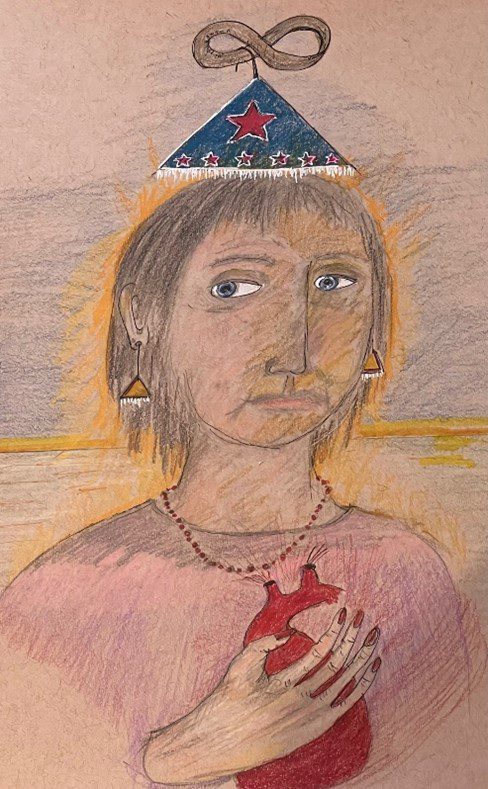
Meditation and joy
“Light” especially includes joy. To reconnect with joy through a meditation exercise is sometimes difficult. However, I have found that it is an important part of finding meaning in chaos.
I think that we are born into life to learn. Each of us has different things to learn, and the life we are given is our teacher. I don’t know whether this is true or not. I don’t even think it is possible to even answer such a question. However, I have found it is, for me, a useful working hypothesis. It helps me when chaos ensues. It has helped me to accept that what I consider chaos is often just something I had not foreseen, something I didn’t want and didn’t plan for.
There is a wonderful quote by Joseph Campbell, the great teacher of mythology and religion. Informed by all his study and life experience, Campbell said the following. It seems to me to have a lot of relevance to the creation of meaning to frame chaos:
“Find a place where there is joy, and the joy will burn out the pain. We must let go of the life we have planned, so as to accept the one that is waiting for us.”
About the Author(s)
Bob Magrisso is a physician and long-time meditator. He tries to practice “applied spirituality”.

